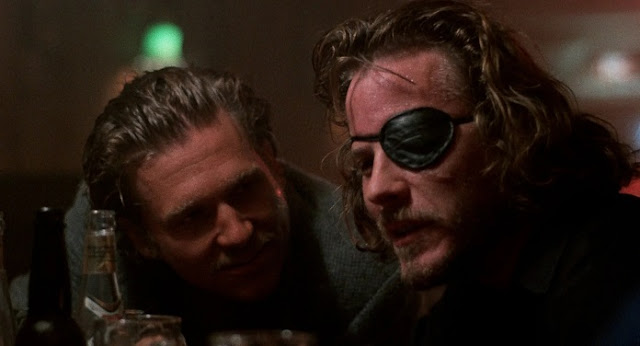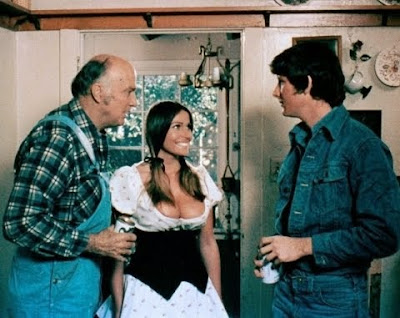Cutter's Way
I did not encounter war veterans like Alex Cutter in my childhood. The active and retired soldiers at church and who visited my elementary school were God fearing, U.S.A. loving men who didn't betray an ounce of disillusionment. But what was in their minds as they spoke their purple prose? What did they say to their spouses in the privacy of their homes, if they indeed even spoke at all?
Hollywood gradually began producing films that deconstructed the emotional fallout of the Vietnam War; films that did not shy away from the thornier, private issues. Films like THE DEER HUNTER, GET OUT YOUR HANDKERCHIEFS. Hal Ashby in 1978 gave us the powerful COMING HOME, an angry but thoughtful meditation on the effects of war on a marriage. In 1981, Czech director Ivan Passer brought CUTTER'S WAY (previously named CUTTER AND BONE), a curious story that appears to be a standard murder mystery that reveals, upon much reflection, to be a complex political allegory. A quite uncomfortable one.
A rootless young man named Richard Bone (Jeff Bridges) witnesses a shadowy figure dump a large object into a dumpster late one evening after his car breaks down in an alley. The next morning, the newspapers report that a murdered young woman was found in that dumpster. Bone is questioned by the authorities. Later the same day, he is hanging with his friend Alex Cutter (John Heard) at a parade and identifies a man he believes is the one he saw disposing the body. It's a sticky issue as the man fingered is a Santa Barbra hotshot named J.J. Cord (Stephan Elliott). In this story, Bone might as well have ID'ed the President of the United States.
Cutter, an embittered Vietnam vet with a prosthetic leg and ill manner ("I don't drink. You know, the routine grind drives me to drink. Tragedy, I take straight.") sees a grand opportunity to act on his conspiracy theory hunches, which appear to dicate his entire existence. He organizes a campaign to harrass Cord until the "truth" sees light. But for most of the movie, he's all talk and bluster. His efforts to propel his passive, ineffectual, and skeptical buddy into action are met with ambivalence. Why? As CUTTER'S WAY progresses, it is learned that Cord more or less owns Bone's boss at the yacht club, where the latter maintains vessels for various jetsetters. The dead girl's sister (Ann Dusenberry) rounds out the trio, sharing Cutter's enthusiasm to bring the fat cat down and hold him accountable.
But there's a fourth figure, Cutter's wife Mo (Lisa Eichorn), long the recipient of her husband's abuse of many varieties. A martyr who stands outside the central dilemma with a clarity not shared by the others. Maybe she's seen it before. Maybe she's worn with cynicism, exposed to years of her husband's tirades and suspicions of his lack of action. Mo is revealed to be a sad adversary unwilling to take this futile quest. Her actions have consequences. Bone's neutrality does as well. No one exits this film unscathed. The final scene is a beauty, a moment frozen in time as if documented by a great painter, realizing an historic event.
The other painter (besides Passer) in CUTTER'S WAY is cinematographer Jordan Cronenweth (BLADE RUNNER, STOP MAKING SENSE), one of my favorites. The "look" he gives this film is all its own, a shimmering, lush filter of Southern California opulence and middle class discontent. Everything looks sharp and gorgeous, a nice incongruity to the screenplay. Sunshine is as menacing as nightfall here.
Heard, never one of my favorite actors, does really solid work in CUTTER'S WAY. His usual smugness is absent as he disappears into a very believable portrayal of a man damaged in a thousand ways, completely self-destructive, and hellbent on finishing that job. Eichorn is another unsung actress who always impressed in her limited screen work (see 1979's YANKS) and is quite memorable as the doomed Mo. One crushing scene shows her in tears during a key moment with Bone; it explains everything we need to know. Bridges is again appealing and effective in a role that doesn't seem (at first) to have much depth.
For all of its merits, CUTTER'S WAY is really at its finest when you examine the screenplay, its mysteries. The metaphors are rich in this movie, the kind in which you scrutinize each character and attempt to assign them with a real-life figure, or perhaps an entire nation, or maybe an Idea. What is to become of a citizen, a country, an ideology when denial and inaction are at last cornered? When you can ignore the climate no longer? Will your actions make you a hero, a villain, or merely a footnote in the pages of history?



Comments